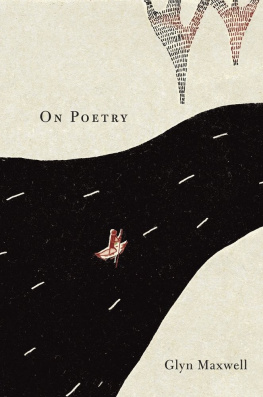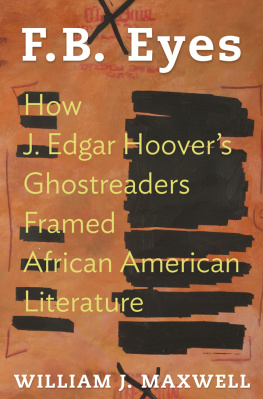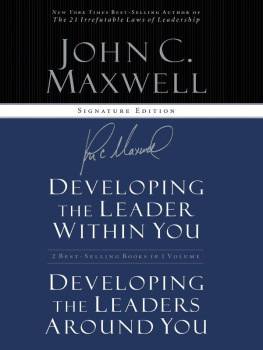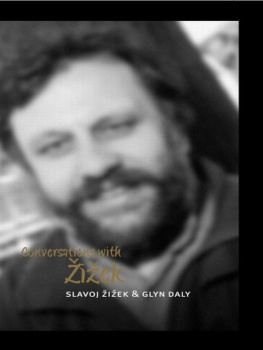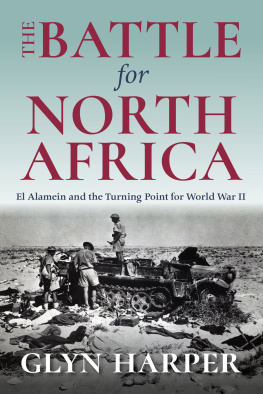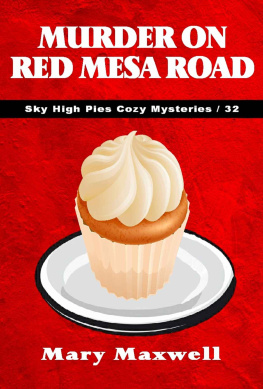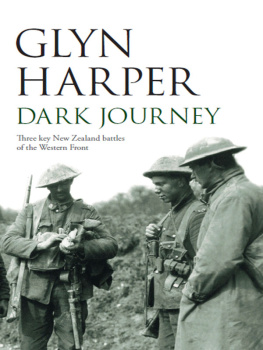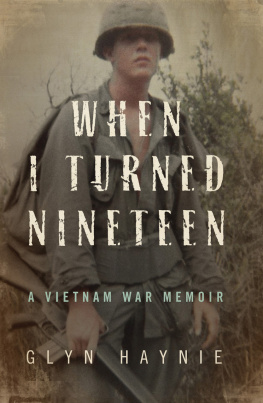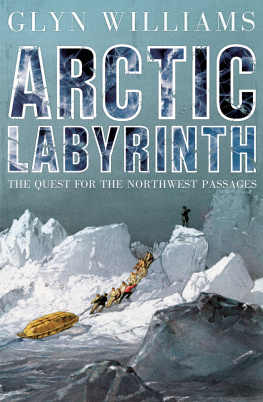Glyn Maxwell - On Poetry
Here you can read online Glyn Maxwell - On Poetry full text of the book (entire story) in english for free. Download pdf and epub, get meaning, cover and reviews about this ebook. year: 2012, publisher: Oberon Books, genre: Art. Description of the work, (preface) as well as reviews are available. Best literature library LitArk.com created for fans of good reading and offers a wide selection of genres:
Romance novel
Science fiction
Adventure
Detective
Science
History
Home and family
Prose
Art
Politics
Computer
Non-fiction
Religion
Business
Children
Humor
Choose a favorite category and find really read worthwhile books. Enjoy immersion in the world of imagination, feel the emotions of the characters or learn something new for yourself, make an fascinating discovery.
- Book:On Poetry
- Author:
- Publisher:Oberon Books
- Genre:
- Year:2012
- Rating:4 / 5
- Favourites:Add to favourites
- Your mark:
- 80
- 1
- 2
- 3
- 4
- 5
On Poetry: summary, description and annotation
We offer to read an annotation, description, summary or preface (depends on what the author of the book "On Poetry" wrote himself). If you haven't found the necessary information about the book — write in the comments, we will try to find it.
On Poetry — read online for free the complete book (whole text) full work
Below is the text of the book, divided by pages. System saving the place of the last page read, allows you to conveniently read the book "On Poetry" online for free, without having to search again every time where you left off. Put a bookmark, and you can go to the page where you finished reading at any time.
Font size:
Interval:
Bookmark:

ON POETRY
First published in 2012 by Oberon Books Ltd
521 Caledonian Road, London N7 9RH
Tel: 020 7607 3637 / Fax: 020 7607 3629
e-mail:
www.oberonbooks.com
Copyright Glyn Maxwell, 2012
Glyn Maxwell is hereby identified as author of this work in accordance with section 77 of the Copyright, Designs and Patents Act 1988. The author has asserted his moral rights.
This book is sold subject to the condition that it shall not by way of trade or otherwise be circulated without the publishers consent in any form of binding or cover, stored in a retrieval system or circulated electronically other than that in which it is published and without a similar condition including this condition being imposed on any subsequent purchaser.
Full acknowledgement for extracts reproduced in this book can be found on pages 172-173.
The Byelaws by Glyn Maxwell was first published in The Times Literary Supplement in 2012
A catalogue record for this book is available from the
British Library.
PB ISBN: 978-1-84943-085-2
EPUB ISBN: 978-1-84943-531-4
Printed and bound by CPI Group (UK) Ltd, Croydon, CR0 4YY.
for Mara Jebsen, Charlotte Walker,
Jesse Ball and Arthur Moffa
Oh, then I must be going, child! said Meet-on-the-Road.
So fare you well, so fare you well, said Child-as-it-Stood.
Anon
T HIS IS A book for anyone.
There are as many outlooks on poetry, on poets, on poems, on poetics, as there are people who read, but my book is for anyone. So forgive me if I leap as far back in time as possible to find a place where we all agree.
*
This far: alert, curious, more or less naked, without language, looking out over the green savannah. Now that was a leap, thats an outlook. You see an open space with trees whose branches spread out near the ground and bear fruit. You see a river or path that winds away out of sight, beyond the horizon. You see a few animals, you see changing clouds. You like what you see. Two hundred thousand years later youll call this outlook beautiful but the words no use to you now.
Time after time, in the field of evolutionary psychology, the children of today, from anywhere on earth, in test conditions, point to this picture, choose it over all others forests, jungles, mountains, beaches, deserts as the view most pleasing to them. What are they looking at? What are they really looking at?
Well, evolutionary psychologists think theyre looking at this: an open space (we can hunt) with trees (we can hide) whose branches spread out near the ground (we can escape) and bear fruit (we can eat). We see a river (we can drink, wash, eat) or path (we can travel) that winds away out of sight (we can learn),beyond the horizon (we can imagine). We see a few animals (we can eat more), we see changing clouds (rains will come again, we can tell one day from another) and, all in all, we like what we see. What evolutionary psychologists and I believe is that aesthetic preferences, those things we find beautiful, originate not in what renders life delightful or even endurable, but in what makes life possible.
*
Art, drawing, writing, poetry are marks made in time by that gazing creature. Poetry has been unnecessary for almost all of creation. Strictly speaking it still is. But it happens to be my savannah, this strictlyspeaking, and it may well be yours, so lets advance together, alert, curious, naked or at least two of those into our first landscape, admiring once again what we cant be without.
*
And, since this is a writers book about writing, lets stop to take with us a leaf from one of the earliest such books to have reached us, Aristotles Politics, where the philosopher observes that practically everything has been discovered on many occasionsin the course of the ages; for necessity may be supposed to have taught men the inventions that were absolutely required, and, when these were provided, it was natural that other things which would adorn or enrich life should grow up by degrees.
Lets start again with nothing. Lets start with poetrys inventions that are absolutely required their names are something and nothing and see what comes of them.
Imagine whiteness, a blank sheet of paper, the white screen
Ready the black of ink or pixels or you
Do this if only to remind yourself that the writing of a poem is a physical act, a deed that elbows into its space and time in the day or the night. The passing of the quill, the fountain-pen, the typewriter, the iPad this too shall pass never changed anything. Perhaps Im addressing you whose need to write verse, to score lines into silence, to drum your fingers into the dark, rises in you in a tangible way, like a tonic, an act of self-healing, a way how not to feel inadequate, empty, forsaken, ill. These adjectives wont seem exaggerated to you Im talking to. Put the blank paper, or the empty screen, right to one side there, and start to know it.
*
Regard the space, that ice plain, that dizzying light. That past, that future. Already it isnt nothing. At the very least its your enemy, and thats an awful lot. Poets work with two materials, ones black and ones white. Call them sound and silence, life and death, hot and cold, love and loss: any can be the case but none of those yins and yangs tell the whole story. What you feel the whiteness is right now consciously or more likely some way beneath that plane will determine what you do next. Call it this and that, whatever it is this time, just dont make the mistake of thinking the white sheet is nothing. Its nothing for your novelist, your journalist, your blogger. For those folk its a tabula rasa, a giving surface. For a poet its half of everything. If you dont know how to use it you are writing prose. If you write poems that you might call free and I might call unpatterned then skilful, intelligent use of the whiteness is all youve got.
Put more practically, line-break is all youve got, and if you dont master line-break the border between poetry and prose then you dont know there is a border. And there is a border. (A prose poem is prose done by a poet.) More of this later, lets just keep staring out that whiteness, get accustomed to its face.
*
You want to hear the whiteness eating? Write out the lyrics of a song you love. Twenty years or so back I might have pointed out that the generations of young poets who judged rhyme a thing of the past nevertheless knew off by heart a good two hundred rock lyrics knitted as gaily as Mother Goose. Maybe some quality rap songs made the old cat-sat-mat thing conscious again. But do write something down. Rock, rap, folk, show-tune, anything, but something written for music, something regarded as truly wonderful in its world, loved by you, loved by your world. Let it try breathing in the whiteness Im speaking of.
Anything you like. I mean love. Say mine is Dylans late song Not Dark Yet. I think thats a timeless song, as memorable as Robert Frost but, unlike Frost, it shrinks in the whiteness. Written down it looks amateurish, Hallmark. Try it with the best, really. Cole Porter, Rodgers Hammerstein, John and Paul, Leonard Cohen, Joni Mitchell, Bob Marley, Tom Waits, Tori Amos, Eminem, Jay-Z, try it. If you strip the music off it it dies in the whiteness, cant breathe there. Without the music there is nothing to mark time, to act for time.
Song lyrics are not written upon whiteness, so the whiteness is alien to them, a corroding air, you can hear it eating those sweet lines away. Song lyrics are not composed to take the formof black signs
Font size:
Interval:
Bookmark:
Similar books «On Poetry»
Look at similar books to On Poetry. We have selected literature similar in name and meaning in the hope of providing readers with more options to find new, interesting, not yet read works.
Discussion, reviews of the book On Poetry and just readers' own opinions. Leave your comments, write what you think about the work, its meaning or the main characters. Specify what exactly you liked and what you didn't like, and why you think so.

